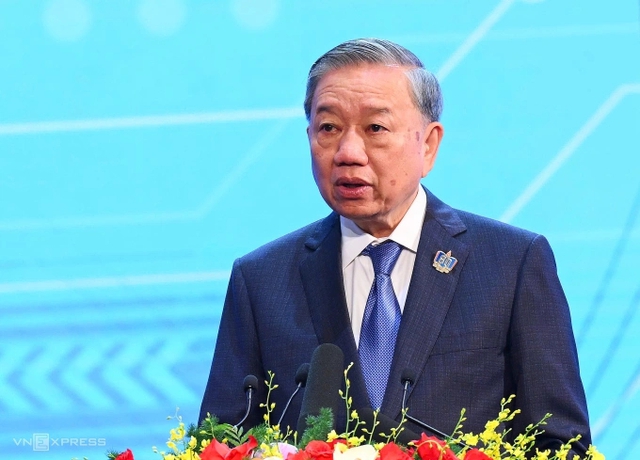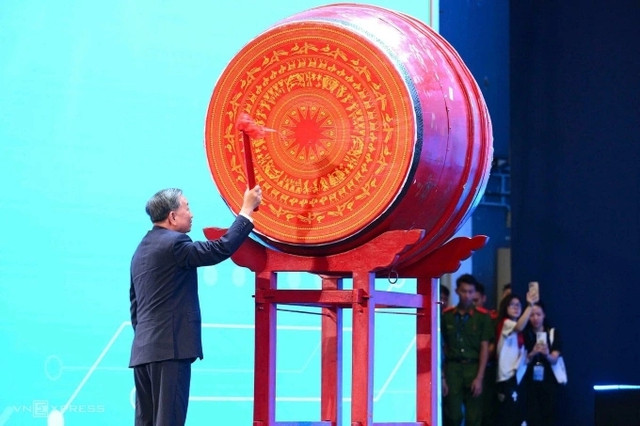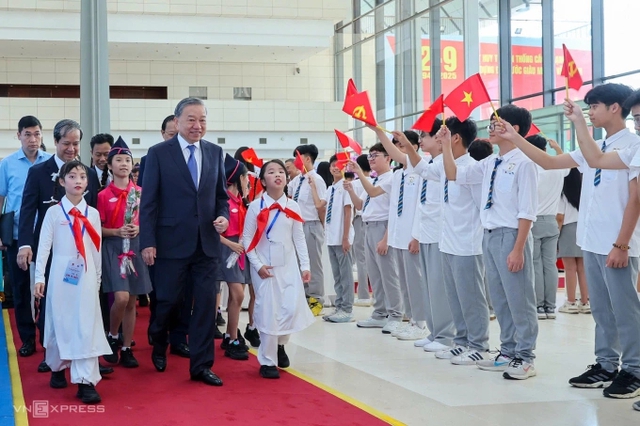Party chief outlines key tasks for building a modern education system
VGP - General Secretary To Lam outlined key tasks for building a modern education system while addressing a ceremony marking the 80th anniversary of the education sector in Ha Noi on Friday.

General Secretary To Lam at the 80th anniversary of the education sector and the start of the 2025–2026 school year, Ha Noi, September 5, 2025 - Photo: Vnexpress
Extending greetings to teachers, education managers, and students nationwide, General Secretary To Lam expressed confidence that the sector would continue achieving breakthroughs, in line with the nation's tradition of valuing learning and its aspiration to rise.
He recalled that over the past 80 years—whether in wartime or peacetime—revolutionary education has stood at the forefront, providing human resources, nurturing talent, and playing a decisive role in national liberation, reunification, and development. Since the launch of Doi Moi (Renewal), the sector has expanded its network, improved quality, and embraced global integration. Yet, he acknowledged challenges such as uneven quality and regional disparities.
The Party leader emphasized that education still remains the nation's top priority. He called on the National Assembly to continue improving the legal framework in favor of innovating education and training; the Government to boost investment in education and training.
The education sector itself, he said, must pioneer in reforming mindset and governance while teachers need to inspire students, and students, in turn, should nurture ambition and aspiration, and learn to become global citizens who meet international standards while preserving Vietnamese identity.

General Secretary To Lam beats the drum to kick start the 2025-2026 accademic year
To drive success in this new phase, the Party chief outlined a shift from incremental tweaks to a bold, nation-building strategy, with quality, equity, integration, and efficiency as guiding principles. Strict discipline in execution was highlighted, alongside ensuring equal access to education to boost literacy nationwide. Priority must be given to remote, border, island, and disadvantaged areas through increased investment in schools, teacher training, student nutrition, and digital infrastructure, ensuring no child is left behind.
He underlined that general education must go beyond knowledge transfer to shape character, foster physical and emotional development, and instill civic responsibility and discipline. The goal is to cultivate a generation that is "talented, compassionate, and resilient," while achieving universal secondary education as soon as possible.
For higher education and vocational training, he called for transformation into hubs of knowledge creation, technology transfer, innovation, and entrepreneurship. Viet Nam, he stressed, should build universities of regional and global standing and modern vocational institutions to produce a skilled workforce for science, technology, industrialization, and digital transformation.
The Party chief also urged stronger international integration in education through joint training programs, credit recognition, academic exchanges, and attracting international scholars.
He welcomed the adoption of the Law on Teachers, which improves teachers' living conditions and ensure their rights while raising professional standards, ethics, and social status.
Calling for accelerated digital transformation and application of AI in education, he described investment in education as an investment in the nation's future. He stressed efficient public spending, stronger public–private partnerships, and mobilization of social resources, alongside building a lifelong learning society as the foundation for a self-reliant nation.
The Party chief also encouraged students students to set clear goals, practice self-discipline in learning, nurture curiosity, and strengthen their capacity to master digital technology and AI in a smart, safe, and humane way. He urged them to live with love, responsibility, and a sense of community, stating that every step forward of students is the future of the country.
The Politburo has recently issued Resolution No. 71 on breakthroughs in education and training. To swiftly translate the Resolution into reality, General Secretary To Lam urged the entire Party to renew its mindset in educational leadership, move beyond outdated practices, and ensure strong, effective implementation.
On this occasion, he presented the first-class Labor Order to the Ministry of Education and Training for outstanding achievements in state management and nurturing talented students who earned top prizes at international Olympiads.

Photo: Vnexpress
Currently, Viet Nam has more than 52,000 schools serving 26 million students, with 65 percent of general schools meeting national standards and many equipped with modern facilities. The 1.6 million-strong teaching workforce has been professionally trained, with elite groups recognized internationally.
The country is also home to 243 universities and over 800 colleges and vocational institutions, with some disciplines ranked among the world's top 500. Higher education contributes around 75 percent of Viet Nam's scientific research and innovation, supported by a growing community of scientists making valuable contributions at home and abroad./.
